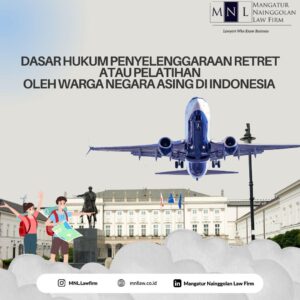
- BACKGROUND
Every foreign national (“WNA”) who intends to travel to Indonesia—whether for temporary residence, vacation, or commercial activities—must obtain a visa permit from the Immigration Office of the Republic of Indonesia.
While foreign nationals typically visit Indonesia for tourism or employment purposes, certain commercial activities – such as corporate retreats or training programs – may be conducted in Indonesia even though all transactional processes were completed in their country of origin.
Visa requirements vary depending on the purpose of the foreign national’s visit, including the type of passport they hold, their planned activities in Indonesia, and the nature of their work. Visa regulations are primarily governed by Law No. 6 of 2011 on Immigration, supplemented by Government Regulations and Ministerial Regulations from the Ministry of Law and Human Rights.
- VISA PERMITS AND LEGAL BASIS FOR PROCESSING INDONESIAN VISAS
A visa is defined as a written endorsement (which may be manual or electronic) issued by an authorized official, permitting entry into Indonesian territory and serving as the basis for granting a stay permit. Under Law No. 6 of 2011 on Immigration, the following visa types and their purposes apply:
- Diplomatic Visa
Issued to foreign nationals holding diplomatic passports for entry into Indonesia to perform diplomatic duties.
- Service Visa
Granted to foreign nationals holding service passports for official non-diplomatic assignments in Indonesia.
- Visit Visa
Granted to foreign nationals entering Indonesia for:
- Government duties
- Education
- Social, cultural, or tourism activities
- Business
- Family visits
- Journalism
- Transit to another country
Visit visas are further categorized into:
- Single-Entry Visit Visa
- Valid for 60 or 180 daysfrom the date of entry.
- Covers activities such as:
- Tourism
- Family visits
- Business meetings
- Medical treatment
- Government assignments
- Other activities under Article 13(1) of Ministerial Regulation No. 22 of 2023 on Visas and Stay Permits.
Can be obtained from Indonesian embassies/consulates abroad or as a Visa on Arrival (VoA) at designated immigration checkpoints.
- Multiple-Entry Visit Visa
- Initially granted for 60 days, 180 days, 1 year, 2 years, or 5 years from the date of entry.
- Covers activities such as:
- Business (audits, branch supervision, film production)
- Non-commercial sports
- Arts and culture
- Tourism
- Limited Stay Visa
Under Article 33(2) of Ministerial Regulation No. 22 of 2023, this visa is granted to foreign nationals for:
- Employment (experts, workers, ship crews, etc.)
- Religious activities
- Research
- Education
- Family reunification
- Investment (with varying durations):
- Up to 2 years (standard)
- Up to 5 years (for individual investors or corporate directors)
- Up to 10 years (for long-term investors under the Second Home Visa scheme)
Thus, if a foreign national intends to conduct a retreat or training in Indonesia, they may apply for either a Single-Entry or Multiple-Entry Visit Visa, depending on their needs.
- TAXATION FOR RETREATS OR TRAINING IN INDONESIA
If an Australian national organizes a retreat or training in Indonesia but their income from the activity is taxed in Australia, the Indonesia-Australia Double Taxation Agreement (Article 24) applies. This means:
- No additional tax is owed in Indonesia if taxes have already been paid in Australia.
- The agreement prevents double taxation for cross-border income.
- CONCLUSION
- Visa Requirements:
- Foreign nationals organizing commercial retreats/training should apply for a Single-Entry or Multiple-Entry Visit Visa based on their duration and frequency of visits.
- Limited Stay Visas are only necessary if the activity involves long-term employment or investment.
- Taxation:
- Australian nationals do not need to pay Indonesian taxes if they have already declared and paid taxes on their retreat income in Australia.
- LEGAL REFERENCES
- Law No. 6 of 2011 on Immigration
- Government Regulation No. 31 of 2013 on Immigration
- Ministerial Regulation No. 22 of 2023 on Visas and Stay Permits
- Ministerial Regulation No. 11 of 2024 (Amendment)
- Indonesia-Australia Double Taxation Agreement
- For further clarification, consult the nearest Indonesian immigration office or a legal expert.
